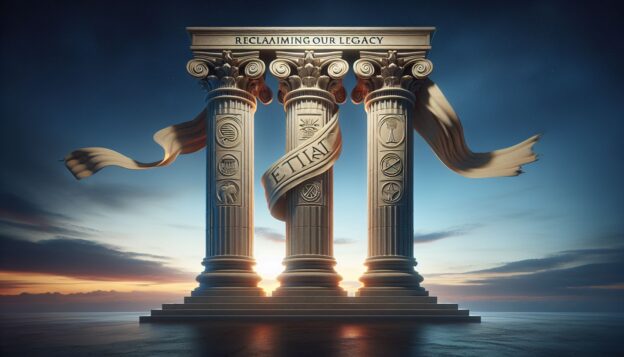In a society where progressive agendas seem to lead the charge, it becomes increasingly important for us as stalwarts of tradition and conservative values to not only articulate our beliefs but also shine a light on the historical foundations that have made this country thrive. It is through the wisdom of the past and the lessons handed down by our forebearers that we can forge a path towards a future that honors freedom, family, and faith. Our aim is to inspire a resurgence of these values, a silent but potent revolution in the heart of American culture.
At the core of conservative values lie the principles that have been guardians of societies through the ages: individual liberty, personal responsibility, a moral order, strong family structures, and a recognition of a power higher than ourselves. These pillars are not mere preferences; they are the bedrock of a functional, enduring society. They represent a North Star amidst the shifting sands of cultural relativism and fleeting trends.
Individual liberty, a concept diligently defended by our Founding Fathers, is far more than a political tagline; it is the very essence of human dignity. It implies the right to self-determination, to pursue happiness and prosperity without undue interference from the state. However, with this liberty comes a crucial counterpart: personal responsibility. One cannot exist without the other. The likes of Theodore Roosevelt—a man’s man, a rough rider, a leader—emphasized the responsibility of each citizen in upholding the values and duties of American life.
Our moral order is the compass that has steered us clear from the jagged rocks of unbridled libertines and moral decay. This is not a call for perfection but an acknowledgment that there are absolute truths and standards by which we should live. The Christian faith, a keystone of many American lives, provides a framework that elevates and dignifies human existence, highlighting the sanctity of life, the sacredness of marriage, and the virtue of self-control.
Family is the nucleus of society, a microcosm of the larger social order. A strong family unit educates the young, supports the old, and stands as the first line of defense against societal ills. We understand that as the family goes, so goes the nation. Icons like Winston Churchill demonstrated through wartime and political strife the strength derived from a robust family support system, his resolve often credited to the stability and earnest guidance from his beloved wife, Clementine.
But all these values pale without the recognition of a higher power. It is humility before God that grounds our liberties, responsibilities, and moral convictions in something greater than ourselves. Leaders like Abraham Lincoln, amidst the brutal crucible of the Civil War, never faltered in expressing his dependence on Divine Providence. His appeal to a moral authority beyond human law helped steer the nation through its darkest hour and towards a new dawn of freedom and equality.
Yet, today, our fundamental institutions and values are under threat by a progressive ideology that champions limitless personal freedom without the balancing scale of responsibility. It promotes a fluid moral system where everything is relative, and nothing is sacrosanct. The nuclear family is often painted as an archaic construct rather than the vital cell of society it truly is. And amidst all this, our youth are taught to dismiss the importance of faith, leaving them adrift without a moral anchor in life’s storms.
As conservatives, we are the keepers of the flame passed on through generations. It is incumbent upon us to reinvigorate the spirit of conservatism in the hearts and minds of the young. We must tell the stories of those giants upon whose shoulders we now stand, individuals who understood the delicate interplay of freedom and constraint, liberty and law. We have to demonstrate, through our own lives and communities, the sheer power and harmony that these values bring when embraced fully.
Let us look to modern bearers of these ideals for inspiration. Take Supreme Court Justice Clarence Thomas, a man whose life story embodies the triumph over adversity through faith, fortitude, and an unwavering commitment to principles. Or consider the example set by the late Senator John McCain, who, despite your agreement or disagreement with his politics, was a man whose dedication to country, and belief in a cause greater than himself, was evident. These men, and countless others like them, show us the caliber of character shaped by conservative virtues.
In our duty to revitalize the conservative principles, we should also embrace innovation and progress, not fear them. Technology, globalization, and the dynamic nature of culture can all be assets if approached with a conservative lens, one that discerns what is to be preserved and what can be improved upon.
Our charge is mighty, yet our resolve must be mightier. We must champion these timeless principles, each in our own way: by leading our families adeptly, engaging in our communities ethically, participating in governance wisely, and living out our faith authentically. It is through such lived convictions that we can impart the gravity and utility of conservatism to those who will shoulder our legacy long after we’ve gone.
In conclusion, the essence of our journey as conservative Christians is to honor what history has shown us to be true and just. As a beacon of hope and reason, conservatism not just offers a worldview but also a practical approach to living that can elevate a nation if embraced with courage and conviction. It is not antiquated; it is not outmoded. It is timeless. And it is our task to illuminate its relevance for a new generation.
